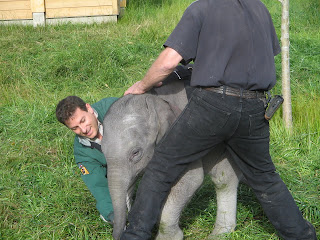This past summer, I went to Oklahoma City for the week-long
International Society of Bassists Convention. While I genuinely intended to chronicle the whole trip, I never really did - all that came out of it was
this one sad little post with a picture of a flight trunk loaded (successfully!) onto a plane.
I always feel a little guilty to promise stuff on this blog - all those concerts I meant to write up, those videos I meant to upload, the Jason Heath blackmail stories, etc. - then never deliver. I decided in this case I would do a little make-up work. Maybe it will all be really exciting, reading my up-to-the-minute thoughts on things that happened 3 months ago? And if no one much cares anymore, that's okay too.
So to get you in the mood, and maybe refresh my memory, here's a little list I'm calling:
Things I Learned at the ISB Convention (So You Don't Have To)DO check out some masterclassesThey're a great chance to meet some of the foremost bassists, and get a sample of what they're like as teachers. This past summer, I got to see masterclasses by Jeremy McCoy, Paul Ellison, Ed Barker, Diana Gannett, Scott Haigh, and Rob Kassinger - who titled his class "Things I Learned the Hard Way, So You Don't Have To" (and inspired this list's title). Like Rob's, many of the classes had a certain emphasis - bow strokes, audition advice, etc. But they were all happy to answer other questions, and most of the sessions seemed to spill out into the hallways, with a crowd of bassists curious for the secret to a singing vibrato, or a really kick-ass brush stroke.
DO bring a bass (if possible) and have stuff ready to playMost of the people at the bass convention did not bring their own instruments - understandably, given the difficulties of travel. I was happy I had mine though, since it meant that I could often play on those masterclasses I just listed. I played for Rob Kassinger, Paul Ellison, and Ed Barker. And Gottfried Engels, a bass professor member of the Dusseldorf Symphony, gave me a fascinating lesson about using my 'hara' to play with a richer sound. (I'd never heard of the 'hara' before this - it's sort of related to the chi.) That's partly why I never got around to writing any of this stuff up; there was just so much of it, and I've got pages of notes messily scribbled on programs.
DON'T eat lunch aloneOkay, you've already flown yourself to a bass convention, one of the geekiest things imaginable. You might as well just geek out entirely, spend all your time talking about bass, and surrounded by people doing the same. One day at the breakfast table, another bassist interrupted our chat about the texture of the eggs and asked, "So what do you guys think about rosin?" It was such a bizarre non-sequitur, and so out of place, I started to laugh. Then I realized he seriously wanted to hear our opinions about bass rosin.
DO enter one of the competitions, if you're eligible and interestedEach year there are several solo competitions for various age brackets, as well as orchestral, composition, and bass makers' competitions. I entered the orchestral competition, and while I wasn't the super-duper grand prize winner (that was Tony Parry), I did have a great time, got some helpful comments, and won a pretty good-sized chunk of cash. The orchestral competition was run like a real audition, with several rounds, and a list of standard solos and excerpts. The solo competitors each presented a full recital program for their final round, which was really cool to watch - all of the competitions are open to the public. So it's worth getting there a day early to listen, even if you're not participating.
DON'T try to keep up with Peter LloydPeter Lloyd was actually a major reason I decided to come to this convention. These are my actual notes from a lesson I transcribed:
come to a bass convention! You will be in 7th heaven! You are tailor made, they are unbelievable, incredibly inspiring, 800 bass players, 50-60 dealers, everything that exists related to bass, 1000s of recordings, bows, every kind of strings, 900 kinds of mutes, 2-3 things simultaneously every hour on the hour
intellectual treatises on how Dragonetti wrote his music, 8 bassists playing Spice Girls, everything in between, fantastic jazz side, only thing you'll regret is having not gone to one sooner - after an hour, he sat in a corner and kicked himself
Given that kind of ringing endorsement, I naturally couldn't resist - and what's more he was right (sadly no Spice Girls this year, but still). The only qualification is that not everyone is built like Peter Lloyd, who actually goes to 2 or 3 events every hour. I tried this briefly, and quickly reached acute bass overload. One event an hour was plenty for me, thank you.
DO try out lots of basses and bowsEventually you're going to need a break from all those recitals, you won't want to hear another word about Viennese tuning, the collected works of Johann Sperger will hold no more mystery for you. That would be a good time to go to the big exhibition room and try out basses. All the biggest shops were represented with dozens of instruments and hundreds of bows. Many of the makers are on hand too, so you're sure to get all your questions answered. Except for, "How in the world can I afford this bass I've suddenly realized I can't live without?"
DON'T miss the evening recitals!A day at a bass convention can feel like a mad scrambling free-for-all, especially if you're trying to follow Peter Lloyd (see above). But the evening is when everyone comes together for some of the most inspiring performances I've ever heard. I fully expected recitalists Ed Barker, Jeff Bradetich, and Joel Quarrington to be awesome - and they each exceeded my expectations. Even more thrilling to hear Thierry Barbe, Renaud Garcia-Fons, Avishai Cohen, and Jacek Niedziela, all of whom I heard for the first time.
DO bring business cards, if you've got themYou're bound to meet lots of new people, have lots of fascinating conversations, and then forget everyone's name and whereabouts soon afterwards. That's what I did, anyway. Best to hand your cards out liberally, and try and collect everyone else's. Hopefully you'll stay in touch with everyone you meet. After all, it's less than two more years until
the ISB Convention 2009 at Penn State University.
 I'm going to suggest something a little more superficial, though: the skin. It's our largest organ, also our most prominent, most often injured, and quickest to heal. We constantly stretch it, squeeze it, splay it, poke it, pluck it - we ask it to be firm, soft, callused, flexible, tough, fleshy, sensitive. Amazingly, it will usually do all these things, without us taking much notice until it cracks, chafes, burns or blisters.
I'm going to suggest something a little more superficial, though: the skin. It's our largest organ, also our most prominent, most often injured, and quickest to heal. We constantly stretch it, squeeze it, splay it, poke it, pluck it - we ask it to be firm, soft, callused, flexible, tough, fleshy, sensitive. Amazingly, it will usually do all these things, without us taking much notice until it cracks, chafes, burns or blisters.


















